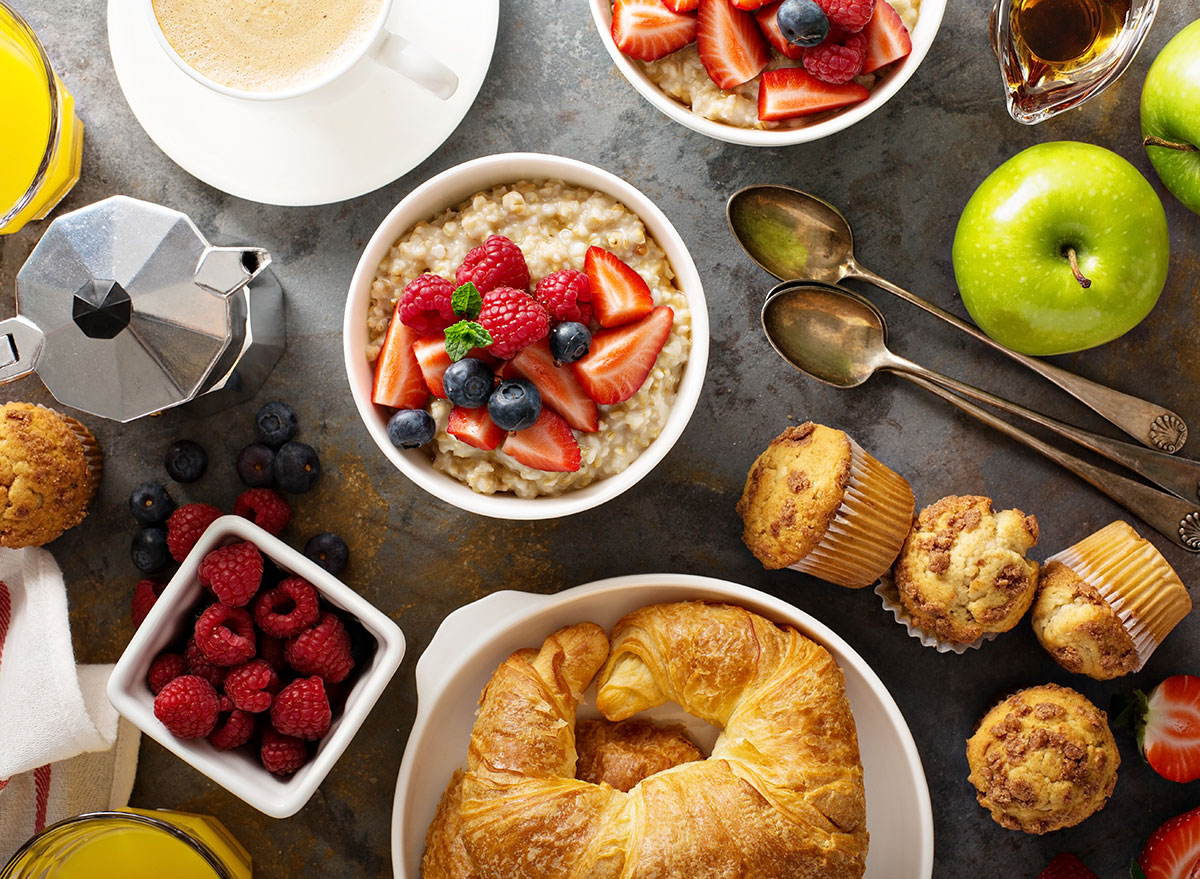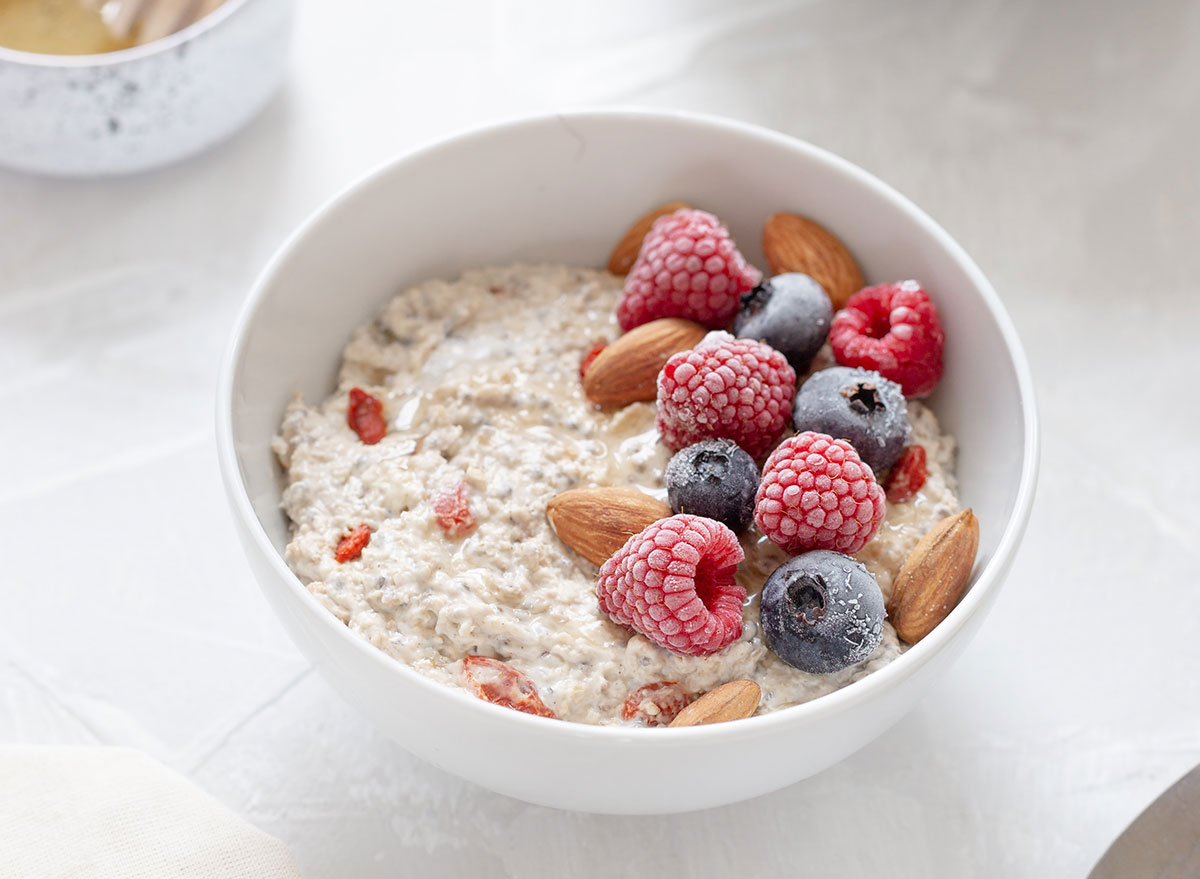The One Breakfast Food To Eat To Lower Your Cholesterol, Says Dietitian

Did you ever wonder why Cheerios is always bolstering itself as a heart-healthy breakfast? The iconic cereal is pictured on the front of each box inside a red heart-shaped bowl, and the box may have an extra banner that says how good it is for your heart, or even how it can help lower your cholesterol. But did you ever wonder why cereal is a good heart-healthy breakfast? That’s because Cheerios are made from 100% whole-grain oats, and given that oatmeal is considered the best breakfast food to eat to lower your cholesterol, it makes sense that Cheerios is constantly marketing it.
According to Lon Ben-Asher, RD and Nutrition Educator at Pritikin Longevity Center, oatmeal is considered one of the best breakfasts to help lower your cholesterol, which reduces your risk of developing cardiovascular disease. It’s all thanks to the fiber content found in oatmeal. (Related: The 7 Healthiest Foods to Eat Right Now)
“Oats are a rich source of soluble fiber,” says Ben-Asher. “Soluble fiber forms a gel that assists in eliminating the cholesterol from our bodies, which means less cholesterol ends up in our blood.”
Why it’s important to lower your cholesterol
First, it’s important to know that your body produces two different types of cholesterol. There is the HDL “good” cholesterol, which helps to remove other forms of cholesterol in your bloodstream and moves it back to your liver, which then flushes it out of your body. Then there’s the LDL “bad” cholesterol, which can build up from lifestyle factors like an unhealthy diet, lack of exercise, smoking, and being overweight, according to the American Heart Association (AHA). High levels of LDL “bad” cholesterol in your blood vessels can result in an increased risk of coronary heart disease, stroke, peripheral arterial disease, type 2 diabetes, and high blood pressure, according to Cleveland Clinic.
So the key is to produce HDL “good” cholesterol in your system, which happens through making healthier lifestyle changes, including eating a healthier diet. This happens when you lower your triglycerides, a type of fat in your blood that will elevate your risk of stroke if you have higher concentrations of it. Trans fat and saturated fat are to blame here, which is why eating a healthy complex carb without these fats—like oatmeal—can help lower your cholesterol.

How the fiber in oatmeal helps with cholesterol levels
As Ben-Asher mentions, consuming soluble fiber can help with lowering the amount of LDL “bad” cholesterol in your blood. Soluble fiber comes from plant-based foods and when consumed, it can combine with cholesterol and flush it out of your system. The National Lipid Association recommends eating 5 to 10 grams of soluble fiber a day, and oatmeal is one of the best sources of soluble fiber you can have.
Related: What’s the Difference Between Soluble and Insoluble Fiber?
“Oatmeal provides a great volume to our stomach because of the high fiber and water content, keeping us satiated and full over a long period of time,” says Ben-Asher. “This ‘staying power’ staves off hunger, thus potentially helping us stay away from the amount of saturated fat and dietary cholesterol foods normally consumed as part of the typical Standard American Diet that can increase our cholesterol levels.”
Along with oatmeal—which has 2 grams of soluble fiber—other great sources of soluble fiber include lean plant-based proteins (beans, legumes), healthy fats (avocado, chia seeds, flax seeds), vegetables (broccoli, Brussels sprouts, carrots, green beans), starchy vegetables (sweet potatoes, green peas), and fruits (apple, berries, banana, peach, pears, mango).
However, if you are looking for one specific breakfast food to eat to lower your cholesterol, oatmeal is the best option. You could even mix in some chia seeds and add some berries on top for an extra cholesterol-fighting boost!
Get even more healthy tips straight to your inbox by signing up for our newsletter! After, read these next:








